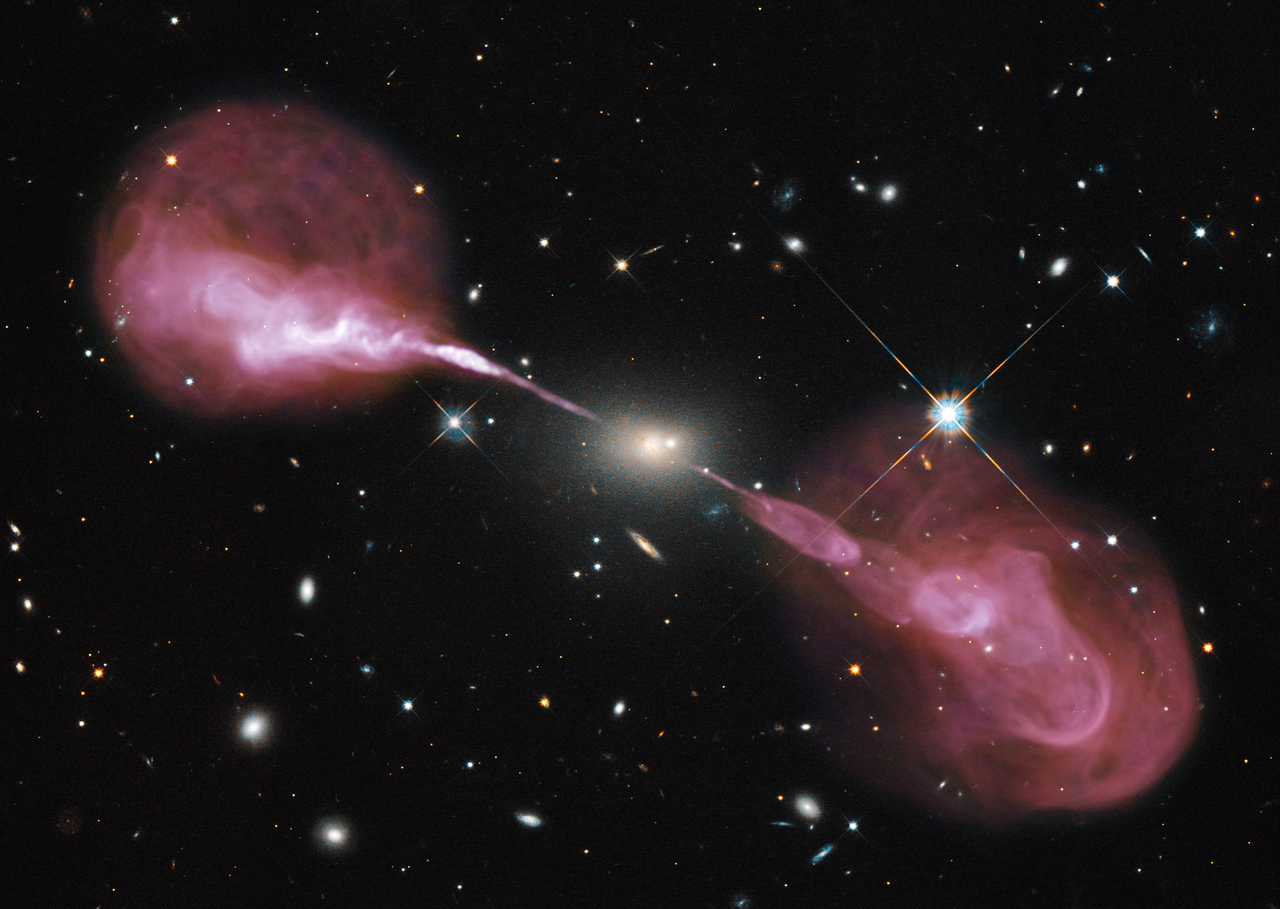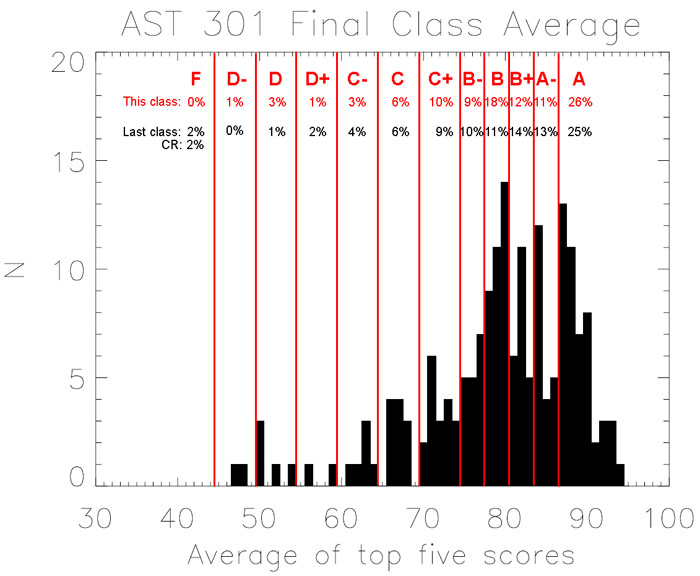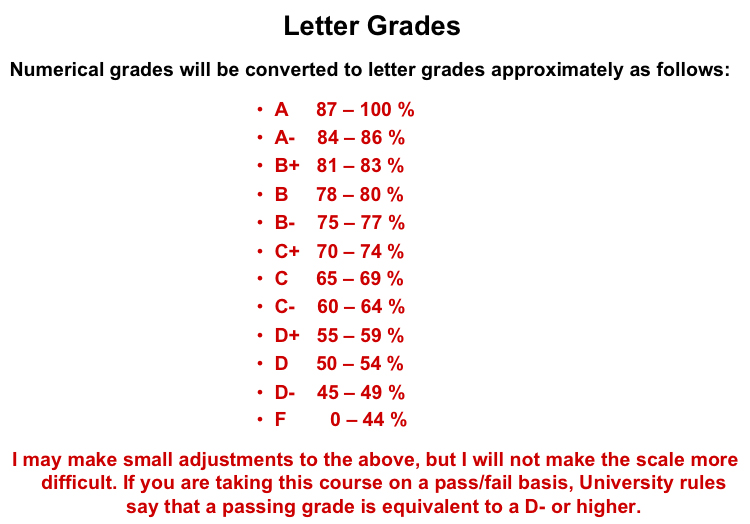
|
ASTRONOMY 301 Introduction to Astronomy Spring 2013
|
|---|

Final grades were posted on Thursday, May 2, 2013 at 10:40 PM. The course is now finished and no further changes to the grades will be made. The final conversion to letter grades was made using the table (still included below) that I announced at the beginning of the course.

The plot above shows the distributions of final numerical grades and letter grades. The bin size is 1 % and the number of people who got final grades in each bin range is N. The vertical red lines are the dividing lines between different letter grades. The red numbers show the percentages of the people in this year's class who got the letter grades indicated. The black numbers show the corresponding percentages for last year's two classes combined. (Since I taught 2 sections last year, the numbers of students are roughly twice as big for each grade as they are this year.) You can see that you did as well as last year's class to within the normal year-to-year scatter. The main difference this year is that the grades are more clearly divided between a big group of As and a big group of Bs. Like last year, few people got Ds. Unlike last year, NOBODY failed the course this year.
Every class cannot score higher than every previous class. Your scores are marginally lower than last year's in the Bs. But there are more As than last year, and fewer Fs. So you really did very well. It was a pleasure to have you in my class! I wish you all the best for successful and happy careers and lives.
Many thanks to John Barentine and Rodolfo Santana for all their help -- both for me and for all of you. Their dedication and sensitivity to your needs made a very big difference to your experience in the course. I am very grateful to them both.
Have a great summer, John Kormendy.
| Unique number: | Section 47935 |
| Classes: | TuTh 2 - 3:30 PM in Welch 3.502 |
| Instructor: | John Kormendy |
| Office: | RLM 15.326 |
| Office Hours: | Wednesday from 4 to 5:30 PM in RLM 15.326 |
| Office Telephone: | 471-8191 (Please don't leave phone messages; send email instead.) |
| Email: | kormendy@astro.as.utexas.edu |
| Teaching Assistant: | John Barentine |
| Office: | RLM 16.312 |
| Office Hours: | Friday at 11 - 12 AM |
| Office Hours: | Friday at 1 - 2 PM |
| Telephone: | 471 - 8275 |
| Email: | jcb@astro.as.utexas.edu |
| Teaching Assistant: | Rodolfo Santana |
| Office: | RLM 16.318 |
| Office Hours: | Monday from 5 - 6 PM in RLM 16.318 |
| Telephone: | 471 - 3466 |
| Email: | santana@astro.as.utexas.edu |
Spring 2013 Syllabus as a gif file.
Spring 2013 Syllabus as a pdf file.
This is a Java tutorial that gives you some feeling for the scales of things (both large
and small) that we will discuss.
There are small inconsistencies between the above map and the one that
I show in class, e. g., in Australia, where the posted map does not show
three, half-hour time zones meeting at one place. Countries frequently make
changes in their time zones; the posted map (from 1997) is slightly out of
date. During the 2000 Millennium celebration, the time zones were as I show
them in class.
Applet demo of the retrograde motion of Mars
Applet illustrating the Doppler effect
Applet illustrating observations of binary stars
Astronomical Picture of the Day
Mars:
A selection of Mars Global Surveyor images
Mars:
Evidence for recent liquid water
Mars:
NASA homepage for Spirit and Opportunity rovers on the surface
COURSE DESCRIPTION: |
This course is an introduction to astronomy for non-science majors. We start with explanations of the seasons on Earth and of what you see when you look up at the sky. Two lectures cover the history of astronomy from the ancient Greeks until the Renaissance. The history of astronomy is also the history of the development of the way that we do science; we will see why science is so successful in teaching us new things. Throughout the course, I try to show you how we learn things about our Universe. I then discuss stars - their formation, life histories, and deaths. This section includes a discussion of our Sun. From stars, we expand our horizons to the study of galaxies of stars and of the Universe as a whole. We look back in time to the beginning of the Universe to give us perspective on how everything around us was created - everything from the stuff that you and I are made of all the way out to the most distant stars. Given this perspective, we then return home to our Solar System. I describe the planets, moons, comets, and asteroids, and I put our planets into context by comparing them to the planets that astronomers are now finding around other stars. All this leads up to a discussion of our Earth, of the history of life on Earth, and of the prospects that there is life elsewhere in the Universe. The emphasis throughout the course will be on conceptual understanding of the "big picture". You will be astonished by how much we can learn about places far away and long ago. | ||||||||
PREREQUISITES? MATH? |
It helps if you had high school science courses, but I do not expect this or require it. I will - as much as possible - start each subject from the beginning. There is only a little math in the course, and even people who have "math anxiety" usually find that the math is not a big problem. I will use "scientific notation" for large and small numbers, and I will introduce about half-a-dozen equations that describe how nature behaves. You never need to memorize equations. If you need them on exams, I will give them to you. But you need to understand what they mean and how to use them. Here is a question that is typical of the reasoning that you may be asked to apply: Your SUV has a 20 gallon tank for gasoline, and you can drive 24 miles with one gallon of gas. If you want to drive 1000 miles, how many times will you have to fill the tank? Most of the mathematical reasoning involves ratios and proportions, and all of the arithmetic that I ask you to do during exams can be done without a calculator. | ||||||||
TEXT: |
Horizons: Exploring the Universe by Michael Seeds and Dana Backman, published by Brooks/Cole and available at the Co-Op. You can get the 9th, 10th, 11th, 12th, or 13th Editions. Older editions are not bad. If you get one, then you will have to be careful about reading assignments: the pages and section numbers mentioned in assignments will correspond to the 12th Edition and may not correspond to those in earlier editions. | ||||||||
CLASS ATTENDANCE: |
VERY IMPORTANT: I strongly recommend that you attend classes. Astronomy is not intrinsically difficult, but it is probably unfamiliar to you, and it is much harder to understand the material if you only read about it. Also, I will omit some subjects that are in the book, and I will lecture on other subjects that are not in the book. You will be responsible for the content of the lectures. I will distribute handouts on the most important things that are not in the book. Don't let the convenience of handouts fool you into thinking that you can skip class. The handouts are supposed to help you to remember what I said. They are not a substitute for coming to class. If you skip classes and study only from the handouts, chances are that you will pass the course but that your grade will be lower than it could have been (for example, C or D instead of B). This is not because I am nasty to people who skip classes (I'm not) but because you will not know the material. | ||||||||
EXAMS AND GRADES: |
There will be 6 in-class exams (see the syllabus). Four of these will follow and cover the 4 major sections of the course. The fifth and sixth are essentially two makeup exams that follow Section 2. So the first half of the class will end with 3 exams on 3 successive class days ending at the start of Spring Break. If you take all 6 exams and do all the homework, you will have 7 scores, each worth 20 % of your final grade. We will then drop your 2 lowest scores and average the rest. There will be no final exam. There is no penalty for missing any one or two exams as long as you get 5 total grades (either 4 exams and the homework or 5 exams and no homework). For this reason, there will be no makeup exams, not even for valid reasons such as medical or family emergencies. 
|
||||||||
HELP SESSIONS: |
If you have trouble understanding something in the course, please ask questions in class or come and see me. I will be happy to discuss the problem with you. The TAs are also available. Review sessions will be scheduled prior to exams and otherwise as needed. | ||||||||
MISCELLANEOUS: |
Astronomy is an observational science. My research depends in part on visits to various observatories, including the University's McDonald Observatory in west Texas. If I miss a class for this or any other reason, the class will meet as usual. You may be interested to visit our Student Observatory on the roof of Painter Hall. It houses a 9 inch refracting telescope. For information on viewing times, please consult our Educational Services Office. |
||||||||
STUDENTS WITH DISABILITIES: |
The University of Texas at Austin provides upon request appropriate academic accommodations for qualified students with disabilities. For more information, contact the Office of the Dean of Students at 471-6259, 471-4641 TTY. Also, please notify me of any modification/adaptation that you may require to accommodate a disability-related need. Specialized services are available on campus through Services for Students with Disabilities. | ||||||||
CLASS RULES: |
Homework assignments will have a due date that is
2 weeks from when the homework is distributed. Late homework
will not be accepted unless you have given and I have
accepted your reason for requesting an extension prior to the due
date. No homework will be accepted after I have discussed the
answers in the help session that preceeds each exam.
As an experiment, homework is optional this semester.
Here's another description of how we will get your final grade:
You can get as many as 7 scores, each of which counts 20 percent of your
grade, for 6 exams and all four homeworks averaged together. We will
then drop your lowest 2 scores and add up the other 5. This means that
you can decide not to do the homework and still drop one exam score.
But if you miscalculate and have to miss 2 exams AND you decided not
to do the homework, then I cannot help you make up a fifth score by
giving you a makeup exam or other extra credit work. So think carefully
before you decide not to do the homework.
If you decide to do the homework,
please make sure that you do all 4 homework assignments. Exam dates: The syllabus lists the dates of the exams. I promise not to change these dates. Please note the dates of the exams, since it is impractical to schedule makeups. Substituting exam 3 for one of the other exams gives you flexibility in case you have to miss a test. I emphasize again: There will be no makeup exams. There will be no final exam. Copying during exams is a crime for which the punishment will be at least an F for that exam and very possibly an F for the course. I will not hesitate to report cheating to the Dean of Students. University standards of academic integrity are posted here. All work handed in for grading must be your own work. It is OK to discuss homework with a friend, but it is important to use your own thoughts and words in writing your answers. If you are puzzled by a question, do not copy a friend's answer. Instead, please discuss the problem with me or with a TA. Don't be shy! We are here to help! Recommendation: When you write homework solutions, show intermediate steps; don't just write down the answer. When the TA grades the homework, he or she needs to see how you thought about the problem. If you get the wrong answer but thought about at least some of the problem correctly, you get partial marks. If the intermediate steps are not shown and the answer is wrong, we can't give you any partial marks. |
||||||||
MORE CLASS RULES: |
Cell phones and laptops:Use of laptops is strongly discouraged. They get in the way of understanding, and they cause distraction for other students. The best way to take notes is NOT to use your laptop but rather to write on the class handouts. You will find that you don't need to do a lot of writing. Cell phone use is not allowed, please. NO TEXTING IN CLASS. |
||||||||
ASTRONOMY DEPARTMENT MEMO: |
Information on astronomy courses and on Departmental rules are posted in the Astronomy Department's Memo to Undergraduate Astronomy Students Copies are handed out on the first day of classes. | ||||||||
UNIVERSITY RULES: |
The University's deadlines and rules regarding dropping the course will be strictly enforced. I will assume that you know the deadlines and the rules. Deadlines are listed in the University's Calendar for Fall 2011 - Spring 2012.
|
John Kormendy's Home Page
University of Texas Astronomy Home Page
Final update: Thursday, May 2, 2013. Total visits since Friday, May 4, 2012 =